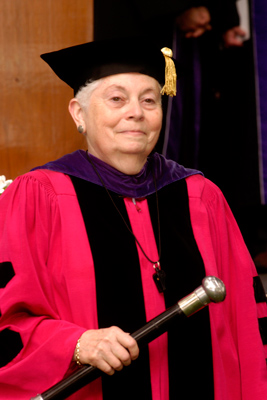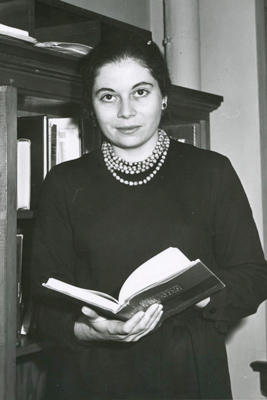November 19, 2014

Amherst College mourns the loss of Rose Richardson Olver, the L. Stanton Williams ’41 Professor of Psychology and Sexuality, Women’s and Gender Studies, Emerita, who passed away today after a long, courageous battle with illness. She is survived by her husband, John, and her daughter, Martha. A memorial for Olver will be held at 1 p.m. in Johnson Chapel on Dec. 13, followed by a reception in Lewis-Sebring Commons at 2:30 p.m.
“Rose was a tremendous presence on campus for decades,” said Amherst President Biddy Martin. “In her time at the College, she not only established herself as a superb teacher and nationally renowned scholar, but also fought for and helped to enact for our women colleagues changes that made Amherst a better institution. More than that, though, she was a kind, ever-thoughtful, beloved member of our community, filled with humaneness and strength. She will be deeply missed.”
Olver joined the faculty of Amherst in the fall of 1962 as an instructor and was named an assistant professor of psychology a year later. Her hiring was a significant milestone for the College: She was the first woman to be appointed a tenure-track faculty member, and she would go on to serve as a mentor for many women who later became professors. Her retirement in 2012—an extraordinary 50 years later—was celebrated with another first, as she became with first woman to have her portrait hang in Johnson Chapel.
“She was an amazing pioneer, and to see her picture in the front of the Chapel reminding us every day of who she was and what she did is particularly fitting,” said Catherine Epstein, dean of the faculty. “She was a remarkable role model and teacher for so many of us at Amherst.”

Olver’s career was marked by other firsts. She was the first woman to chair an academic department—psychology—and the first faculty member to serve as dean of freshmen. In addition, she chaired numerous committees, including the ones that guided Amherst’s transition to coeducation and created the Women’s and Gender Studies Department (now the Sexuality, Women’s and Gender Studies Department). From 1993 to 2007, she also held the respected and high-profile position of faculty marshal, leading the faculty processions at Convocation, Commencement and other important occasions.
Olver’s research evolved over the years but primarily focused on social and cultural factors that influence the cognitive development of young children and the gendered development of men and women across the life span. She was considered a leading expert in the psychology of self.
“Rose was the epitome of wisdom, patience and kindness—there was no better person to lead us as faculty marshal,” said former Dean of the Faculty Gregory S. Call, now senior advisor to the president and professor of mathematics. “She was a true visionary who had grace in difficult circumstances and the perseverance to stick with it until she succeeded.”
Olver grew up in Philadelphia and graduated from Swarthmore College in 1958. She met her husband John while both were in graduate school in Cambridge and they were married on September 12, 1959. She then completed work toward her Ph.D. at Radcliffe College in 1961 and during the next year was a research fellow in cognitive studies and a lecturer on general education at Harvard, where much of her own doctoral research had been done. She came to Amherst in 1962, she wrote in Gender Matters: The First Half-Century of Women Teaching at Amherst, a book she co-authored and published this year, “feeling very lucky to have a faculty position (most women in my graduate school cohort were offered research positions) and a job in the same town as my husband, who had just accepted a faculty position at the University of Massachusetts Amherst.” Her daughter Martha was born in 1969.
At the time of Olver’s hiring, the College—like so many other all-male institutions of higher education in the early 1960s—was only beginning to address the issues around coeducation and feminism. As such, she faced challenges, she said in Gender Matters, but she persisted and soon flourished.
“She was one of the wisest women I know—more than anyone, she knew how to make real change without seeming to rock the boat,” said Jane Taubman, professor of Russian, emerita. “She did so much for the status of women at the college just by example, but she also made a point of sharing advice and support. She was incredibly caring and nurturing to all of her colleagues.”
Outside of the campus community, Olver was an enormous supporter of her husband John’s political career as a member of the Massachusetts House and Senate and then the U.S. House of Representatives. She would give speeches for him and participate in events when he was unable to attend, said Elizabeth Aries, the Clarence Francis 1910 Professor in Social Sciences (Psychology).
Olver also played the piano, knitted, attended plays and traveled. Some favorite destinations for the Olver family included Ellsmere and Baffin islands, as well as Costa Rica and the Galapagos.
“This is a huge loss for Amherst and me personally,” said Aries. “Rose has inspired my life with her kindness, generosity and support. I have relied on her advice and insight since I began at Amherst in 1975. She was an adored role model, a colleague and a close friend.”
Memorial donations would be welcome to the Hospice of the Fisher Home, 1165 North Pleasant Street, Amherst, MA 01002, or the Hitchcock Center for the Environment, 525 South Pleasant Street, Amherst, MA.
We invite members of the Amherst College community to leave notes and remembrances by logging in and clicking “Add comment” below.